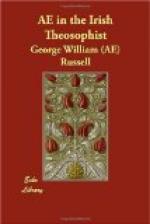—June 15, 1895
—“Yes, and hope.”
They bring none to his or to her terminus or to be content and full, Whom they take they take into space to behold the birth of stars, to learn one of the meanings. To launch off with absolute faith, to sweep through the ceaseless rings and never be quiet again. —Whitman
Here is inspiration—the voice of the soul. And we, who professed to bring such wisdom, what have we to say? Have we uttered with equal confidence such hopes, or with such daring and amplitude of illustration? Let us confess we have not. There are one or two exceptions which will occur to everyone. Now, as we adventure afresh, let us see what it is has brought despondency and failure in our work upon us in the past. I think it is because we have been saying things we have never realized; we have been repeating without imagination the words of those few leaders. We have lowered their heroic tone because we thought we were speaking to a fallen people who could not respond to our highest. But it was not the way, it was not the way. It is not with the dust we have brotherhood, but with the ancient spirit it clouds over. To this spirit we must speak heart to heart as we know how. I would not willingly recognize aught in anyone but the divine. Often indeed the form or surface far removed from beauty makes us falter, and we speak to that form and so the soul is not stirred; it will not respond. But an equal temper arouses it. To whoever hails in it the lover, the hero, the magician, it will answer, but not to him who accosts it as Mr. So-and-So. Every word which really inspires is spoken as if the Golden Age had never passed. The great teachers ignore the personal identity and speak to the eternal pilgrim. Do we not treasure most their words which remind us of our divine origin? So we must in our turn speak. How often do we not long to break through the veils which divide us from some one, but custom, convention, or a fear of being misunderstood prevent us, and so the moment departs whose heat might have burned through every barrier. Out with it— out with it, the hidden heart, the love that is voiceless, the secret tender germ of an infinite forgiveness. That speaks to the heart. That pierces through many a vesture of the Soul. Our companion struggles in some labyrinth of passion. We help him, we think with ethics, with the moralities. Ah, very well they are; well to know and to keep, but wherefore? For their own sake? No, but that the King may arise in his beauty. We write that in letters, in books, but to the face of the fallen who brings back remembrance? Who calls him by his secret name? Let a man but feel for that is his battle, for that his cyclic labor, and a warrior who is invincible fights for him and he draws upon divine powers. Let us but get that way of looking at things which we call imaginative, and how everything alters.




